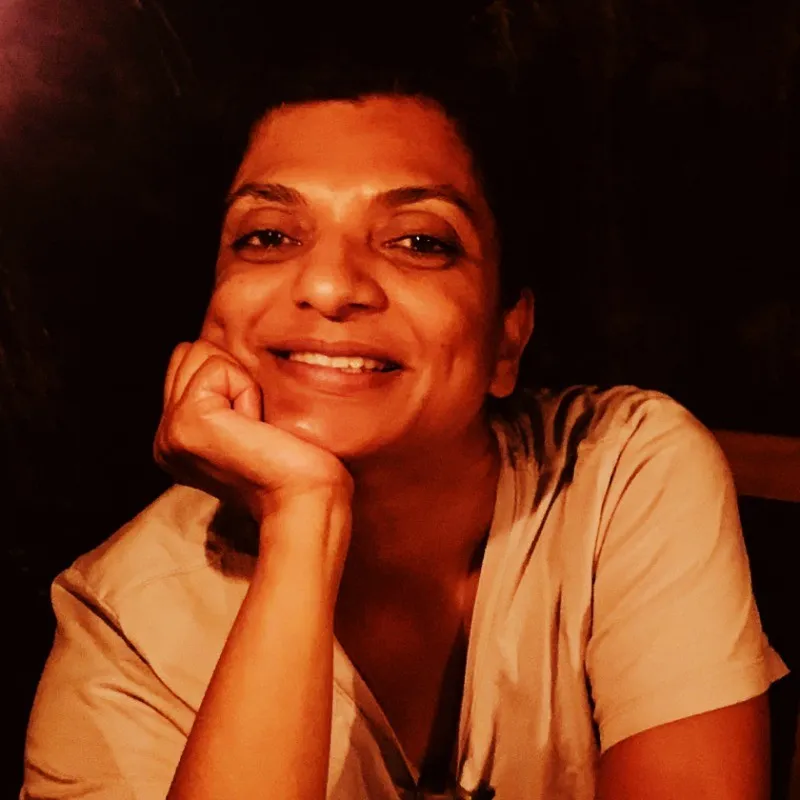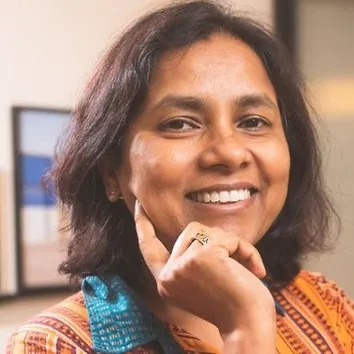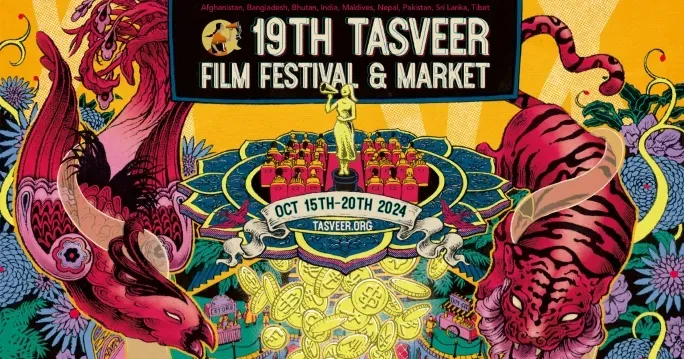The 19th annual Tasveer Film Festival and Market brings the South Asian cinematic scene to Seattle October 15 through 20 with events, forums, and screenings at venues throughout the city. The festival portion kicks off with the Pacific Northwest premiere of writer-director Iram Parveen Bilal's Wakhri (One of a Kind) at the Paccar IMAX Theater at the Pacific Science Center on October 17.
This year's lineup includes from all over South Asia, including strong LGBTQ+ shorts, features, and documentaries telling a variety of stories, from the brutally hard-hitting to the goofily Bollywood fabulous. Additionally, for the second straight year, Tasveer remains the only Oscar-qualifying festival in the world for South Asian shorts.
I sat down with Rita Meher, founder of the Tasveer Film Market and cofounder of the festival, and Shailaja Rao, associate director and festival director, to discuss this year's six-day event. Our conversation hit on a variety of topics, including how the pair anticipate Tasveer continuing to grow and evolve into the premier South Asian festival in the United States. What follows are the edited transcripts:
Sara Michelle Fetters: We're roughly a month from the start of the film market, followed two days later by the opening night of the festival. How are you feeling right now? What's the level of anticipation?

Shailaja Rao: I can only speak for myself, but I'm having a blast. [laughs] A little overwhelmed with everything that's going on, yes, but I'm so looking forward to the festival. I cannot even put it in words.
SMF: Rita, as the co-founder of the festival, could you imagine how things would've transformed in less than 20 years, starting from your humble beginnings at the Broadway Performance Hall to what it is now?

Rita Meher: Yeah, it's incredible. It's the 22nd year for the organization and the 19th for the film festival. I would have never imagined where it's at today. But, internally, it never feels that big. I'm still like, "Oh, we are this small little organization." [laughs]
I was telling my friends the other day, I've been doing this for 19 years, but the excitement doesn't go away. It's the same nervousness, same excitement. It's like a new thing, like a new baby. Everything from scratch. We can say we are reinventing the wheel. At the same time, we are not. We are using the same processes, but they still feel brand-new. Right, Shailaja?
SR: Yes. I think- like in any process, there's always some learning... But it's all fun... I keep telling Rita, "This is what we can do for next year." I'm always learning. I'm already thinking of next year based on my learning this year.
SMF: We're used to film festivals here in Seattle. We have lots of them. It seems like we have a great one every month, and this year we've got the Seattle Queer Film Festival the weekend before this one. You're back to back.
But Tasveer is unique in that, as of 2023, it's both a film festival and a film market. For people that don't quite understand what that means, could you explain what the market aspect is, which might be a little bit more unusual to some people outside of the Pacific Northwest filmmaking community?
RM: We've been doing the festival for 19 years, but I think it's not enough to keep doing things the same way over and over and over. We need to exhibit films in the best way as a festival, yes, but we were also starting to think, how do these get made? How do they come to life? And how can we help them get seen?
A lot of our films, they don't get picked up [by distributors], they don't get funded. We need to find a solution to that. We need to make the journey easier for filmmakers to get these great ideas to come to life. We have to support them. We have to put our force behind them, and that's where this whole "film market" thing came in.
What we are doing is putting the filmmaker, producers, and their teams in front of the decision makers. We're walking the talk. We're putting our thoughts into action. We are bringing all the decision makers to Seattle, not sending them to LA.
Tasveer is one of a kind. This has never been done before in the Pacific Northwest, where all these big companies - WME, CAA, Blumhouse, Netflix, NBCU, Amazon Studios, Warner, etc. - all come under one roof to meet with South Asian filmmakers.
SMF: Shailaja, as a programmer who helps put the schedule together, knowing that you're going to have the eyes of the biggest distributors in the world coming to Seattle to partake and be a part of the festival, what does that feel like?
SR: It's extremely exciting. To be facilitating this entire thing, bringing filmmakers together, sales agents, distributors, producers? It's amazing.
We're bringing everyone together under one roof, and this doesn't only benefit Tasveer, but literally all of Seattle is going to be economically and culturally gaining. It's a win-win for everyone.
The other thing I'd really like to point out is, yes, we are a South Asian organization, we are facilitating this for South Asian filmmakers, underrepresented filmmakers, but the product that we are going to bring out of belongs to everyone. It is universal. It is going to be for white, black, brown, yellow, any color in between, any gender, any denomination - it's for everyone. This lineup is for everyone in the audience. That's always the goal.
SMF: I am so glad that you brought that up, because one of the reasons I love Tasveer so much is the storytelling diversity that you offer up seemingly every single year. I honestly don't know how you do it, but every year, the storytelling - between the shorts, the features, and the docs - is just magnificent. There's always something unique to discover.
How do you do that? How do you track all of these down and make sure that multiple genres are represented? That everything comes together in this glorious South Asian mélange?
SR: It's not easy. [laughs] Once it's all done, the lineup, it looks great, I know, but it takes a lot of effort to make sure that what we pick is representative of South Asia.
We get tons of submissions. For example, we got five hundred submissions this year, and to sift through those, and bring it down to 110 for our final lineup, was no easy task. We not only have to bring it down, but then we have to make sure that we have that potpourri of films that we can showcase in our festival that represents that diversity you're speaking of.
RM: Diversifying is our mainstay of our festival, [and] we want to make sure that LGBTQIA takes a good space, that all the countries are represented, and that marginalized communities are represented. We really work hard at this, and programming is the soul of our festival. Shailaja this year, as the festival director, and our programming team have done a great job.
SMF: As you say, you don't just talk the talk, you also walk the walk. Your opening night feature this year is also part of your LGBTQIA showcase, Wakhri And not only that, you also get to have this opening night celebration at the Paccar IMAX. How cool is that?
SR: It's gigantic. It's dreamy. It's awesome.
RM: And not just opening night. Closing night, too, is at the Paccar IMAX, and the [short] film is part of the LGBTQIA package. Blue Boy [the short] and A Nice Indian Boy [the feature] - you'll be blown away by that pairing.
Blue Boy is going to be a little bit of a challenge for our audience when they watch that, and it may push some points that will make people think in a different way. It's kind of standing up to what's happening in South Asia right now, and how voices are being silenced. It's really pushing the envelope.
And then to end on the wonderful A Nice Indian Boy It's Bollywood and even includes a wedding. It's just so funny, and it's not the usual stereotype, with the parents being against Gay marriage or anything. It's, like, just a usual family: parents being nervous about their son getting married to someone who's not at the same- status, or something like that. It's just a funny Bollywood film, and very quirky.
SR: I'd just like to emphasize, if you don't mind, Sara, that most all our films are not shown in mainstream theaters. You do not get these topics covered in mainstream media. These are really niche, but also the real deal. Like, these are the stories that grab the heart and soul of South Asia.
SMF: And that's part of the great thing about having all of these distributors here, don't you think? It's obviously not going to happen for every film, but there is the chance that for some of these titles that don't normally get exhibited on a larger platform, somebody from say Netflix or Universal could look at it and go, "You know what? We want to put that out there to more viewers."
SR: Right. That would be the goal.
And, there's a lot of learning in our films. I learn something every time I attend the festival. There's always moments where I'm like, "Oh! I did not know that the Sri Lanka civil crisis led to this taking place," and so many other instances like that. Even as South Asians, there's always something new to learn.
SMF: I love that. Another thing attendees may not know - and I believe this happened just last year is that Tasveer is now an Oscar-qualifying festival. What does that mean?
RM: That's right, yes. And we are not just an Oscar-qualifying festival, we are the only South Asian Oscar-qualifying film festival in the world. There's no other South Asian festival that has that qualification. It means that any short film that wins in our festival by a jury will get put straight into the big pool of Oscar short-listers. Before, these had to chase other big festivals, whether it's Sundance or Cannes, and maybe a South Asian film will get picked, but it was never guaranteed. This way, it's guaranteed for [one] to go onto the Oscar shortlist, every year.
SMF: In my time in Seattle, I've watched Tasveer grow and evolve. I have to congratulate you all on all that you've been able to do, and the way that you've just been able to showcase these films that, as you've said, are underrepresented and don't necessarily get the eyeballs that they deserve. It's magical.
RM: Thank you for that.
SR: And, as far as growing, I would like to point out All We Imagine As Light, which is Payal Kapadia's film that won the 2024 Cannes Grand Prix. [Our screening is] going to be the North American premiere.... We are honored to be having this being showcased at Tasveer.
SMF: Do you want to highlight any others you think might be of interest to LGBTQIA viewers?
RM: Yes. I would love to. Mehroon is a favorite. It's a Trans short made by and about the title character. Her name has been removed from a will unless she comes back as a man, as a son that was born to the family. Very powerful. No dialogue. Just a beautiful film.
Katlaa Curry is a feature shot in a village in Gujarat, [which] is a very powerful state now, so it's fun to see a Gay film coming out of [there].
And Pink is a British film [in which] a man is reconciling with his father, [who he thinks] doesn't approve of him. It is the most powerful film, [particularly] how he finds out how proud his father is of him when he comes back into this man's life.
SR: There's one called The Story of Yuvraj and Shahajahan. It's [about] two men: one is a Bengal, and he sells bracelets in the village. It's just about their friendship. Very subtly done, very sensitively done. It takes up the [issue of Hindus and Muslims] together, so there's that element as well. It's beautifully done.
SMF: Where do you both see Tasveer growing from here? How do you see it continuing to evolve?
RM: We see it evolving to be the Sundance of South Asian film festivals. Anytime anyone makes a South Asian film, they will be wishing for [it] to make it to Tasveer. We want to get there, not by volume, but by quality, by serving the film community, and by supporting and providing resources behind the scenes with below-the-line workers and above-the-line executives. We also want to exhibit these films in the best way we can, which we are doing right now. Anything to add, Shailaja?
SR: You've said it beautifully. I think maintaining our mission, our values, and the quality of films that we put out every year - just keeping in line with that is, yes, that is something that I believe strongly in.
Additionally, and luckily for me, I get to see that we maintain relationships with the filmmakers, even after we're done with their films. We build that relationship. We keep that relationship. That's very beautiful, and very special. For me, that relationship is a most important thing.
The 19th annual Tasveer Film Festival and Film Market runs Oct. 15-20. Opening night is on Oct. 1,7 with a red-carpet gala screening of Wakhri (One of a Kind) at the Paccar IMAX Theater at the Pacific Science Center. Additional venues for this year's festival are SIFF Cinema Uptown, Tagney Jones Hall, and the UW South Asia Center. A full schedule of events and ticket and pass information can be found at https://tffam2024.eventive.org/welcome
Support the Seattle Gay News: Celebrate 50 Years with Us!
As the third-oldest LGBTQIA+ newspaper in the United States, the Seattle Gay News (SGN) has been a vital independent source of news and entertainment for Seattle and the Pacific Northwest since 1974.
As we celebrate our 50th anniversary, we need your support to continue our mission.
Your contribution will ensure that SGN remains a beacon of truth and a virtual gathering place for community dialogue.
Help us keep printing and providing a platform for LGBTQIA+ voices.
How you can donate!
Using this Link
Text "SGN" to 53-555
Or Scan the QR code below!



